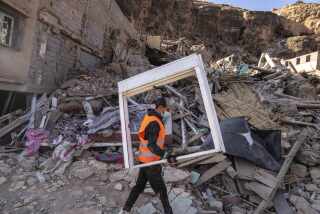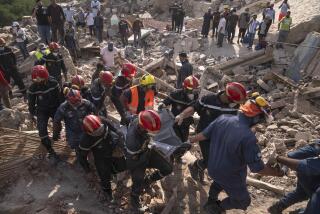King Helps Guide Morocco Toward Democracy : North Africa: Ruler has kept Muslim extremists at bay while acting as a critical conduit for Arab relations with the United States and Israel.
- Share via
RABAT, Morocco — To hear the king tell it, opposition politicians are misguided novices who should just take their benevolent sovereign’s advice.
“My bitterness is that of the teacher who is not well understood by his pupils,” King Hassan II said in a recent speech about the aftermath of last year’s parliamentary elections.
He is bitter about challenges to his right to choose the prime minister, the opposition’s refusal to join the new government and the tendency to dismiss progress toward democracy in Morocco.
Hassan, who has ruled this North African country in authoritarian style since 1961, remains firmly in control despite the criticism.
Morocco also will be in the international spotlight soon. It is expected to join Egypt as only the second Arab nation to recognize Israel, and more than 100 countries will sign the GATT world trade agreement in Rabat in April.
Hassan, 64, is an anchor in an unsteady region, deftly steering his kingdom on a delicate path between West and Middle East. A standard-bearer for Islam, he has kept Muslim extremists at bay while acting as a critical conduit for Arab relations with the United States and Israel.
Perhaps nowhere is this dual role better illustrated than in Casablanca, where the world’s largest mosque was opened in August within sight of the first McDonald’s in the Arab world, which opened a month earlier.
The king began moving toward democracy because of impatience at home and pressure from Washington, indicating that his goal was a bipartisan system akin to the British and American. Morocco is now run by a technocrat Cabinet with no links to the new Parliament but, as usual, Hassan calls the shots.
He remains chief of the military and faithful lieutenants head the Justice and Interior ministries to keep a lid on dissent.
Rabat’s wide boulevards and look of prosperity belie the nation’s nagging poverty. The average monthly pay of a schoolteacher is equivalent to $220 and agricultural problems have been worsened by drought. Unemployment is officially 16%.
Nonetheless, Morocco is stable, unlike neighboring Algeria, where economic problems have spurred an Islamic insurgency.
Foreign investment in Morocco is growing, as are the textile, food processing and tourism industries. Visitors come for the lush beaches, skiing, Saharan camel treks, magnificent palaces and ancient ruins.
Complaints are not hard to find among the king’s 25 million subjects.
“Nothing has changed,” said Mounia, a medical student from Rabat who would not give her full name for fear of reprisals. “The king should think of people’s lives instead of trying to build the world’s biggest mosque. Muslims can pray anywhere. What good is it if people go hungry?”
Democrats have some reasons for cheer. As a result of the 1993 elections, Morocco has its first two female legislators, first Jewish member of the Cabinet and a new Human Rights Ministry--significant in a country that has been accused of torturing dissidents.
“They were probably the best elections the Moroccans ever conducted,” a Western diplomat said. “There were specific incidents which tarnished the process, but overall it was well done.”
The opposition alliance, known as the Koutla, has 122 of the 333 seats, by far the most since Hassan ascended the throne. But pro-Hassan parties and their affiliates won 169, giving them a majority.
Under Morocco’s complex electoral formula, two-thirds of the seats were filled by direct election and the others indirectly, by professional groups and local councils often dominated by supporters of Hassan.
Mohamed Elyazghi, leader of the Socialist Union of Popular Forces, a member of the opposition alliance, accused the government of using trickery to gain its majority.
In Rabat, he said, his party and the National Rally of Independents won the two indirect seats over a pro-government candidate when ballots were counted in front of party observers, but a pro-government candidate was given the second seat half an hour later.
“It was a hijacking of the constitution,” he said in an interview. “If that could happen right under our noses here in Rabat, think what happened elsewhere.”
In a speech after the elections, Hassan was both tough and patronizing, offering most Cabinet posts to the Koutla alliance, but not the important ones.
Because no one in the Koutla had served in government for three decades, he said, none of its leaders was qualified to be prime minister.
Of the Foreign Ministry, he said, “If I entrust this portfolio to one of you, Morocco will find itself isolated.” He would choose the justice minister, said Hassan, and “as to the Interior Ministry, I will never entrust it to a party.”
The Koutla turned down the Cabinet posts.
Not all supporters of the opposition are critical of Sidna, or Master, as Hassan is known.
“According to the constitution, the king is divine, and that’s it,” said Azdine Tazi, a carpet dealer who supports the nationalist Istiqlal Party.
Mounia, the medical student, has a different view: “We need people who are liked by the people, elected by them. That’s not how it is now.”
More to Read
Sign up for Essential California
The most important California stories and recommendations in your inbox every morning.
You may occasionally receive promotional content from the Los Angeles Times.













